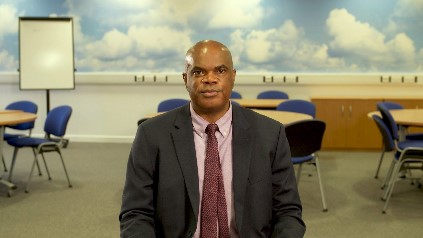A professional view: Samuel Seidu (MBChB, PGCME, MSc, MD, FRCGP, FRCP (Edin)) is a Clinical Professor in Primary Care Diabetes and Cardio-metabolic Medicine at the University of Leicester and a practising GP. He is also currently a Clinical Lead and mentor for diabetes in the Leicester, Leicestershire, and Rutland Integrated Care System.

A typical morning
My typical day starts at 8am, with a review of all laboratory results from the previous day and tasks from other clinicians. From 8am, I start a morning surgery list of about 18 patients, of which more than half will have diabetes. The first four patients will normally be those with high HbA1c's, who need to have their medication increased. These appointment slots are typically just six-minutes long, during which various ways to best manage their diabetes are suggested.
These are immediately followed by 12 other face-to-face slots of a mixture of complex diabetes presentations and other general practice consultations.
"The people with diabetes could be presenting for review of the conditions, not just related to glycaemic control but the management of the associated complications or other long-term conditions such as neuropathies, ulcers, depression, heart failure, worsening renal function or even memory impairment. The difficulties of managing such patients are that there is no formula to approach the consultation."
I'm led by the patient and the focus is on addressing their care and clinical needs. To do this, I have to gather all the relevant data, identify concerns and expectations and then manage as appropriate, all within 10 minutes.
Complex consultations
The time allocated for such complex consultations is never enough. This has always been the case, even when general practice consultations were for single-problem consultations. Today, much longer consultation times are needed as people are living longer with multiple long-term conditions. Consultation time from previous years, however, is still the yardstick with which access in general practice is measured.
Occasionally, there are always one or two people who, after spending more than the allocated time in the appointment addressing their multiple long-term conditions, leave the consultation room and when they reach the door, will stop and say, ‘oh by the way, while I am here….’. This later addition sometimes could be the most serious problem which cannot be left for later. I normally address that if I can. The time constraints means it can impact on the day.
Afternoon clinics
My last two patient-slots are normally reserved for people who have medical problems that need urgent attention from their GP on the same day. These could be patients with mental health problems who are suicidal, or have severe acute physical problems.
The morning clinic typically finishes at 12pm. I then we start debriefs and tutorials with junior doctors, until 1pm. From 1pm, I have various meetings. These can include, regional diabetes strategy meetings, practice meetings, primary care network meetings, managing complaints, processing referrals, non-NHS letters, repeat prescriptions and other administrative and operational work.
Did I mention lunch or toilet breaks? No, that is a luxury, I just weave this in between patients.
The afternoon clinic starts at 3pm until 6pm and we repeat the same process.
Final thoughts
People with diabetes tend to have other long-term problems as well. Not many specialist clinicians can see the patient and have the skill sets to tackle the problems holistically. Most other specialists will only deal with one area and pass the patient back to another specialist.
It’s only the GP that is equipped to attempt to manage the patients’ biological, social and psychological factors in a single encounter. This makes it difficult to be able to deliver care in 10-minute appointments today. Primary care needs other trained healthcare professionals, such as minor illness nurses, paramedics, social prescribers, and pharmacists, to help deal with non-complex targeted conditions, which will allow the GP more time to focus on more complex presentations.
If you are a healthcare professional and would like to write for News & Views, please contact healthcare@diabetes.org.uk with an outline of your idea.
